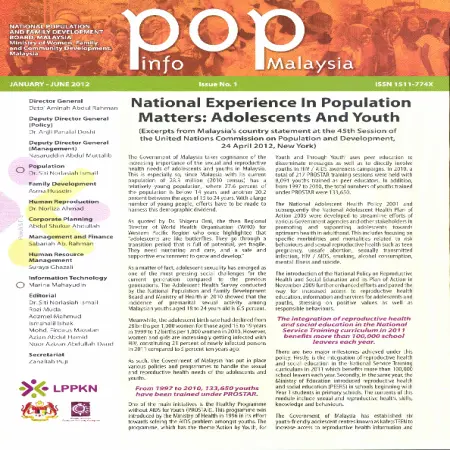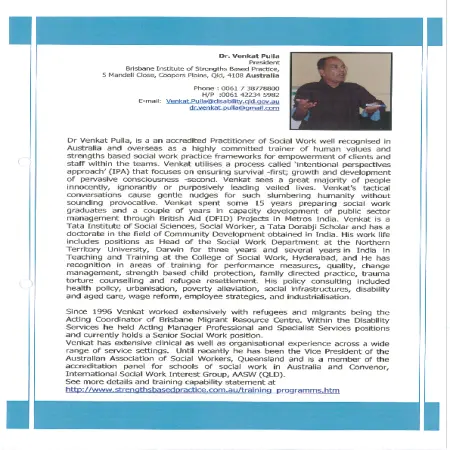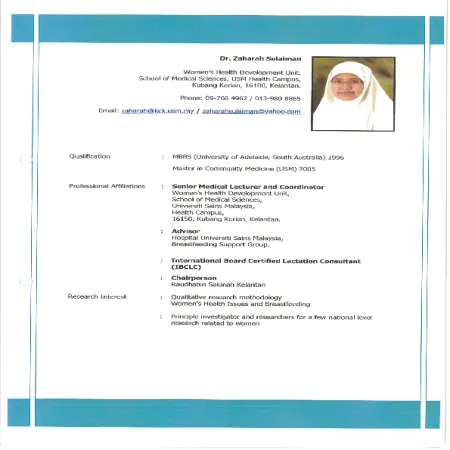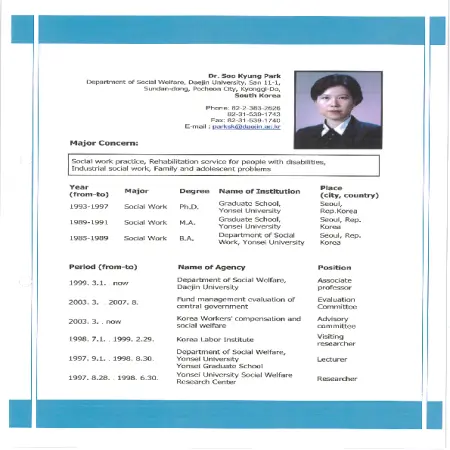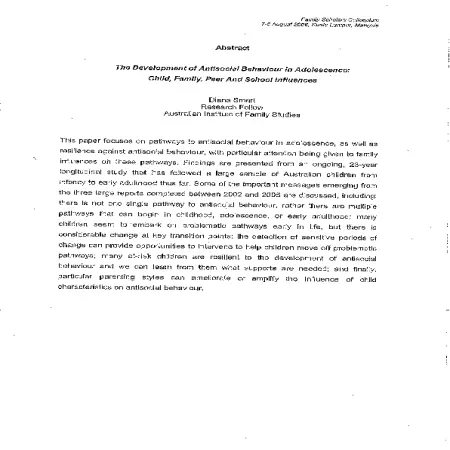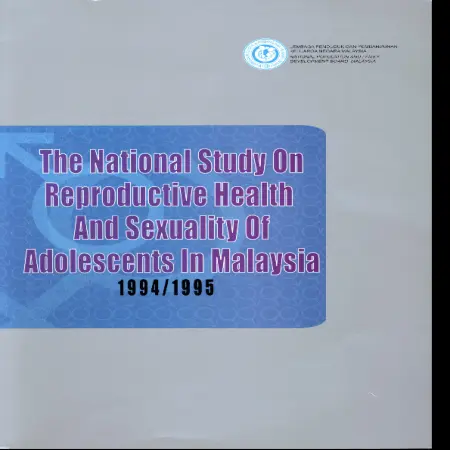TOPICS
Results for Topics : "Adolescent"
|
|
National experience in population matters: adolescents and youth
Item Type: Newsletter
Editor:
Year: 00/00/2012
Abstract: Adequate and accurate sexual and reproductive health information helps young people to make informed and responsible decisions. Howewer, cultural and religious sensitivities within the communities remain one of the major challenges in implementing reproductive health education for young people. Parents are still uncomfortable talking about reproductive health matters with their children ,leaving their children dependent upon information from their peers or other sources like the internet. The Government of Malaysia takes cognisance of the increasing importance of the sexual and reproductive health needs of adolescents and youth in Malaysia. Hence, the Government of Malaysia has put in place various policies and programmes to handle the sexual and reproductive health needs of the adolescents and youths. One of the main initiatives is the Healthy Programme without AIDS for Youth (PROSTAR). The Government of Malaysia also has established six youth-friendly adolescent centres known as kafe@TEEN to increase access to reproductive health information and services for young people aged 13 to 24 years.
|
|
|
|
|
|
Kajian Penilaian Modul Pendidikan Kesihatan Reproduktif dan Sosial (PKRS) dalam kalangan Pelatih PLKN
Item Type: Research Report
Editor:
Year: 00/00/2011
Abstract: Adolescents are the future leaders of the country and have a huge influence on the social, economic and political situation of the country. However, with the presence of various social problems that plague teenagers today, it is feared that it will affect their future which in turn is detrimental to the country. The Ministry of Women, Family and Community Development (MWFCD) has taken the initiative by developing the Reproductive and Social Health Education Policy and Action Plan (PKRS) which aims to produce individuals who are knowledgeable and have a positive attitude in the field of reproductive and social health. Under this PKRS program, the National Population and Family Development Board (NPFDB) is one (1) of the agencies that implement the program. In line with the implementation of this policy, the National Service Training Council has agreed with MWFCD's proposal for PKRS to be implemented in PLKN. Following that, NPFDB has implemented one (1) Pre and Post Test Study to trainees to assess the level of knowledge and perception on reproductive and social health before and after the teaching of this PKRS module is conducted. This study also aimed to examine the sexual and reproductive behaviors of trainees.
This study was conducted in 2011 in a cross section on PLKN Trainees aged 17 years and above in selected National Service Training Camps in Malaysia using independent random sampling. The total sample required was 1,038 people. The calculation of this sample size is based on an estimated 31,200 PLKN trainees who are required to attend training using Confidence Interval (95%), Margin of Error (1.5%) and Prevalence of Having Sex Out of Wedlock Among Adolescents (6.5%), (Naing L, 2006). Questionnaires were developed according to the needs and objectives of the study. One-third of the questions of this questionnaire were adapted from an international study, namely the Youth Risk Surveillance Survey, 2011 but adapted according to the objectives of the study and the culture of the community in Malaysia. The method of questionnaire administration was self administered. The scope of the questionnaire covers three (3) domains namely demographic information, knowledge and attitudes towards reproductive and social health as well as adolescent sexual behavior. A total of 1,300 pieces of assessment forms (pre and post -test) were distributed during the first teaching session of the module. Of that number, only 1,063 forms were received for analysis. After the initial analysis was conducted, it was found that there were some questions that were not fully answered by the respondents. Therefore, the data analysis will vary according to the number of participants who answered for each section. In total, a total of 1,063 respondents were successfully covered in 13 training camps nationwide.
The results of the descriptive analysis showed that the respondents consisted of 57.8% male adolescents and 42.2% female. The majority of respondents were aged between 17 to 19 years (95.6%) with a mean age of around 18 years. Based on the ethnic composition, 66.7% are Malays, 15.3% Chinese, 4.2% Indians and 13.8% are other ethnicities including Sabah and Sarawak Bumiputera. Most respondents have SPM education (95.6%) and are unmarried (99.6%).
The overall findings of the study can be summarized that the level of respondents' knowledge on reproductive and sexual health increased significantly (p <0.05) after undergoing the PKRS module with an increase in mean knowledge score of 7.04±2.2 (before undergoing the module) to 9.17±2.1. A total of 71.1% of respondents obtained a score of 9 out of 12 items (75.0%) and above after undergoing the module. There was a significant change in attitudes (p <0.05) on reproductive and social health after undergoing PKRS training. This indirectly shows that this PKRS module seeks to help respondents change their attitudes in a more positive direction.
A total of 10.4% of respondents admitted to having had sex. The mean age of having sex for the first time is about 15 years. 45.5 percent of them had sex with more than one partner. Only 2.1 percent admitted to being sexually attracted to the same sex with 18.2% of them admitting to having had same -sex sex.
|
|
|
|
|
|
A Study on health status of youth in Malaysia
Item Type: Research Report
Editor:
Year: 00/00/2010
Abstract: This study analyzed health screening of 22,840 youths, who were distributed equally by ethnicity and camp sessions. Based on the analysis, 21.6% of youths were underweight, 18.1% pre-obese and 10.3% obese, with 0.3% perceived having body image disorders. With regards to sexual and reproductive health issues, 39.6% admitted viewing pornographic materials, 28.5% practiced masturbation, 6.5% engaged in premarital sexual relationships, 5.5% had multiple partners and 1.6% had been involved in homosexual relationships. History of abortion was discovered by 0.5% of the respondents. Almost a quarter of the youths were smokers, while 8.7% had consumed alcohol and 1.4% admitted taking drugs. The study also revealed that 6.2% of respondents reported to have past involvement in bully and 14.1% in fight. About 7.1% of the respondents revealed they had been physically abused while 1.2% of them had been sexually abused. Mental health problems were noted in 27.5% of the youths, with depression in 9.8% of the youths, anxiety in 20.7% and suicidal ideation in 11.8%. Psycho-social problems such as substance use, antisocial behavior, physical/sexual abuse and mental health problems among youth are interrelated with common risk and protective factors. Management of psycho-social problems in youths should be holistic; looking into risk and protective factors. Programs and interventions should focus on strengthening of protective factors among youth such as family connectedness and religiosity.
|
|
|
|
|
|
Kajian Pendapat Remaja dan Isu Sosial : mencari penyelesaian
Item Type: Research Report
Editor:
Year: 00/00/2010
Abstract: Introduction of Reproductive and Social Health Education Policy and Action of Plan (PKRS) has been developed which aims to produce individuals who are knowledgeable and have a positive attitude in the field of reproductive and social health. Under the PKRS program, the National Population and Family Development Board (NPFDB) has been given the mandate as the main agency in implementing the program. One of the programs is the Life Skills Program for teenagers which uses two (2) modules, namely the Cakna Diri Module (I’m In Control) and the Kesejahteraan Hidup Module. The purpose of this module developed is to improve adolescents' skills in aspects of reproductive health in order to avoid high-risk behaviors that lead to several problems such as premarital pregnancies, sexually transmitted diseases and HIV. Therefore, an opinion poll was conducted to see the general view on social issues of adolescents, especially from the aspect of reproductive health and the implementation of the Life Skills Program for adolescents.
|
|
|
|
|
|
Understanding coping and resilience of children and adolescents
Item Type: Conference or Workshop Item
Editor:
Year: 00/00/2009
Abstract: The objectives of this paper are to identify and define key concepts and models related to stress, coping, and resilience amongst children and adolescents and also to make us mindful to area wise gaps in our evidence based practice in this context. Amidst the growing evidence that depression and other mental health issues are surfacing amongst children and adolescents in several societies, the author focuses on the transactional nature of coping and resilience and how children and adolescents process a variety of stresses that they see in their day to day lives. Given that children and adolescents attempt to cope well in stressful situations being a fact, the author considers constructing and reviewing this stressful experiences in a person-environment transaction context to be a useful strategy. The paper presents this strategy.
|
|
|
|
|
|
Achievement and challenges in managing female adolescents guidance Centre: experience share from Raudhatus Sakinah Kelantan
Item Type: Conference or Workshop Item
Editor:
Year: 00/00/2009
Abstract: Adolescents today are exposed to various social ills such that they are easily influenced by unhealthy activities, be it directly or indirectly. Many of them have become victims of abuse, maltreatment, neglect, undue psychological stress, rape, incest and others. Raudhatus Sakinah (RS) was thus establish as an institution that provides shelter and guidance to female adolescents who become victims of these social ills. RS strives to offer help to affected adolescents by increasing the level of their confidence and abilities so that they may develop into individuals that contribute positively to society and religion. RS has been in operation since August 1998 under the administration of Wanita Pertubuhan Jamaah Islah Malaysia (WJIM). RS is an established ongoing project to help curb social ills in the society, with special attention to helping adolescents. RS was officially registered under the Care Centre Act 1993 with the Department of Social Welfare. Later in 2004, RS Kelantan was set up in Kota Bharu. RS Kelantan shelters up to a maximum of 25 adolescents girls at any one time. They have to go through a year of rehabilitation program which focuses on spiritual and self development syllabus besides life skills and recreation activities. This paper will focus on the five year experiences, achievement and challenges faced by RS Kelantan in running the centre.
|
|
|
|
|
|
The effect of negative and supportive behaviors of their parents and friends on substance abuse risk among Korean adolescents and implications for family resilience intervention: gender differences
Item Type: Conference or Workshop Item
Editor:
Year: 00/00/2009
Abstract: Substances use among adolescents is particularly because early initiation of substance not only leads to many detrimental impacts on their lives but also is predictive of both increased use and more serious patterns of use in their adulthood. Thus, it is important to identify potential substance users and factors related to substance use because these efforts may provide important information to help adolescents who are at high risk for substance use. Many studies documented that parental alcoholism and peer substance use are the most predictive risk factors for substance use among adolescents. On the other hand, there is ongoing debate among researchers on the influence of social support from family and friends on substance use by adolescents. Also, individual factors such as self-esteem, emotional coping, and academic performance have been shown to be associated with substance use among adolescents. Unlike western society, little is known about gender difference in the prevalence and correlates of substance use among adolescents in South Korea. Accordingly, this study aimed to identify the prevalence of substance abuse risk among South Korean adolescents and to examine the effects of negative and supportive of parents on their substance abuse risk by gender. The participants were 1,981 high school youths between the ages of 16 and 19 years (mean, 17.69) residing in Seoul city. Data collection was conducted conveniently choosing high schools in Seoul. Participants completed a self-report survey which included measures of substances abuse risk of adolescent and his or her best friend (using a POSIT scale), parental alcoholism (using the CAST), supportive behaviors from either parent or friend (using multidimensional scale of Perceived Social Support), Rosenberg's self-esteem scale, COPE scale developed by Carver et al. and gender, age, perceived economic status and academic performance.
|
|
|
|
|
|
The development of antisocial behaviour in adolescence: child,family, peer and school influences
Item Type: Conference or Workshop Item
Editor:
Year: 00/00/2006
Abstract: This paper focuses on pathways to antisocial behaviour in adolescence, as well as resilience against antisocial behaviour, with particular attention being given to family influences on these pathways. Findings are presented from an ongoing, 23-year longitudinal study that has followed a large sample of Australian children from infancy to early adulthood thus far. Some of the important messages emerging from the three large reports completed between 2002 and 2005 are discussed, including: there is not one single pathway to antisocial behaviour, rather there are multiple pathways that can begin in childhood, adolescence, or early adulthood. Many children seem to embark on problematic pathways early in life, but there is considerable change at key transition points; the detection of sensitive periods of change can provide opportunities to intervene to help children move off problematic pathways; many at-risk children are resilient to the development of antisocial behaviour and we can learn from them what supports are needed; and finally, particular parenting styles can ameliorate or amplify the influence of child characteristics on antisocial behaviour.
|
|
|
|
|
|
I'm in Control module (Teenagers)
Item Type: Module
Editor:
Year: 00/00/2000
Abstract: The main objective of the I'm in Control module is to empower teenagers with the appropriate knowledge, attitudes and skills to make informed choices about their sexual and reproductive health. This module is targeted at teenagers aged 13 - 17 years and focuses on building skills to prevent and reduce the risks to pregnancy, sexually transmitted infections and HIV/AIDS. Skills provided include identifying and avoiding high risk situations and using assertive techniques to avoid premarital sex.
|
|
|
|
|
|
The National Study on reproductive health and sexuality of adolescents in Malaysia 1994/1995
Item Type: Research Report
Editor:
Year: 00/00/1996
Abstract: The National Study on Reproductive Health and Sexuality of Adolescents in Malaysia was initiated with the aim of formulating a National Programme on Reproductive Health for Adolescents. The specific objectives of the study are:
i. to establish the status of the knowledge, attitude
and practice of adolescents with regard to sexual
and reproductive health,
ii. to identify the constraints that adolescents face in
seeking information and service relating to sexual
and reproductive health,
iii. to obtain the participation of adolescents in the
design and implementation of programmes and
activities for their own welfare.
The single most expected outcome of the Study on Reproductive Health and Sexuality of Adolescents in Malaysia is a Cabinet memorandum which will propose appropriate policy and programme changes for the promotion and maintenance of optimal reproductive health among Malaysian adolescents geared towards the year 2020. This Memorandum will serve as a vital national reference and benchmark for evaluating future trends and patterns. It will be the basis for the reorientation of values, attitudes and approaches for the management of sexuality and reproductive health of adolescents in the country.
|
|
|
|





